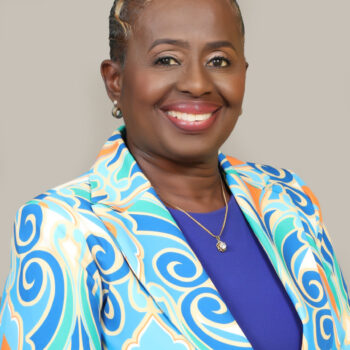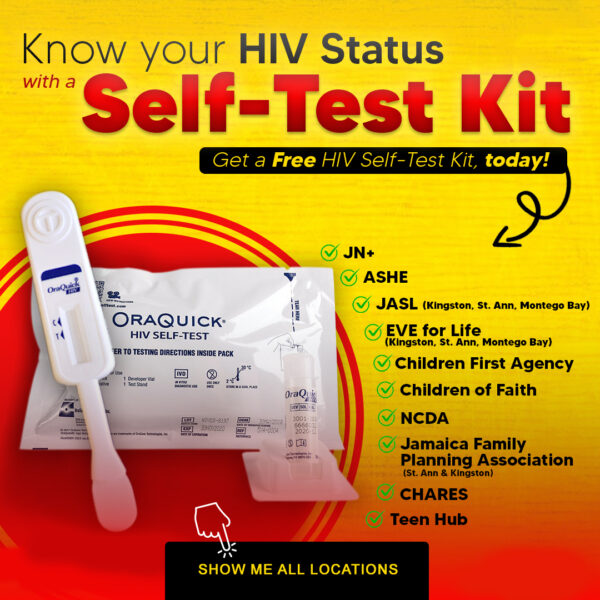We are the government agency responsible for sexual and reproductive health information and services in Jamaica. We conduct research, develop campaigns and disseminate information, deliver and monitor sexual and reproductive health services, distribute contraceptives and we contribute to the development of an enabling environment for all.
A Snapshot of the NFPB
OUR MISSION is to provide guidance, leadership and advocacy and implementation of quality equitable sexual health education and services to enable all Jamaicans to achieve optimal sexual health outcomes throughout their life course and OUR VISION is to see all Jamaicans achieving optimal sexual health in an environment where their sexual rights are respected, protected and fulfilled.
Meet the Executive Director

Dr. Lovette Byfield – BA., MA., PhD Public Health
Principal Director
2018 – Present
With a strong background in public health practice, specifically health promotion, behaviour change communication and HIV prevention Miss Byfield has been the Director of HIV Prevention responsible for the Management of the Prevention component of the National HIV/STI Programme, Ministry of Health, Jamaica. She currently holds the position of Principal Director of the National Family Planning Board (NFPB). A doctoral candidate in Public Health she has the benefit of being an adjunct lecturer in the Doctorate in Public Health programme in the Department of Community Health and Psychiatry, University of the West Indies (UWI), Mona campus in Jamaica.
Our History
Emergent Phase
Family Planning Services were first available in Jamaica in the 1930s through the efforts of a number of committed individuals. In the 1950s, services were strengthened when social work associations and interest groups collaborated and established the Jamaica Family Planning Association. In 1963, the Government of Jamaica (GOJ) officially recognised problems associated with population growth and the need for family planning. Consequently, the Government initiated services in selected hospitals, and established a special unit in the Ministry of Health (MOH) to give direction to and cooperate with non-governmental organisations (NGOs). The Bureau of Health Education, which began providing educational materials and training for family planning, enhanced these initiatives.
Development Phase
In 1967, the GOJ created the National Family Planning Board (NFPB). Throughout the 1970s, family planning gained greater visibility and importance for Jamaica’s development agenda. The NFPB, empowered by the National Family Planning Act (1970), became the Government agency responsible for preparing, implementing, coordinating, and promoting family planning services in Jamaica.
The 1970s were also landmark years for programme implementation: Family Life Education (FLE) teacher training workshops began, as well as a scheme for the commercial distribution of condoms and oral contraceptives.
In 1974, the GOJ officially integrated family planning services with the MOH. Mass media (radio, television, billboards, and print) became an important information dissemination channel for launching the “Two Is Better Than Too Many” campaign.
By the end of the decade, an island-wide network of family planning clinics was operating and birth rates had decreased from 34 per 1,000 in 1970 to 28.
Expansion Phase
Throughout the 1980s, the family planning programme began to soar quickly as a result of several benchmark events. The NFPB established specialised family planning clinics in underserved areas, and international donors accelerated support for clinical and counselling services in public clinics. The GOJ officially adopted the National Population Policy (1983), which reinforced political commitment to the reduction of fertility and the expansion of family planning services for all men and women of reproductive age. Multiple public and private sector projects increased the availability of family planning and introduced alternative approaches to service delivery. Highlights from this decade included establishing the following:
- Male responsibility programmes;
- Community-based distribution of contraceptives in rural areas;
- An adolescent fertility resource center;
- The Parish Liaison Officers Programme;
- Mobile units integrating family planning into nutrition programmes; and
- Services designed for teenagers in urban areas.
Since 1990, the programme has focused on increasing consumer access, improving service quality, and achieving financial sustainability. Between 1992 and 1995, surveys and special studies helped to define unmet needs, legal and regulatory constraints to programme expansion, and strategies for increasing private sector participation in family planning service provision. New technologies were introduced, including Norplant, female sterilisation (mini-laparotomy), and no-scalpel vasectomy for men. A commercialised initiative, Personal Choice, introduced a wide range of safe, low-dose oral contraceptive pills and contraceptive injectables at prices affordable to many more Jamaicans.
In 1994, the Government assumed greater financial responsibility for public sector contraceptive procurement due to dwindling donor resources and the growing need for family planning services among Jamaicans.
Thus, during the expansion phase, the family planning programme significantly increased consumer awareness and service access, expanded contraceptive choices, and consolidated into a cohesive national programme encompassing a large number of public and private sector organisations.
1996 - 2012
With the success of the ‘Two Is Better Than Too Many’ campaign of the late 1970’s and early 1980’s in reducing the number of unplanned pregnancies, the NFPB continued the execution of activities/programmes that would foster behaviour change and strived for more efficient and effective service delivery. This was seen through strategic plans and programmes that sought to:
- Contain population growth;
- Reduce the Total Fertility Rate (TFR);
- Increase the retention rate at family planning clinics;
- Enhance efficient use of resources;
- Expand access to existing but underused family planning and RH options for women;
- Improve access to Reproductive Health Information to Adolescent and Youth;
- Expand access to reproductive health information and services to men;
- Promote safe sexual behaviour, attitudes and practices to reduce the prevalence of STIs and HIV/AIDS;
- Achieve more effective synergy between the HIV prevention and Family Planning Programmes;
- Empower adolescents and youth to take responsibility and reduce sexual risk taking behaviours;
- Promote self-efficacy and the complementary roles of males through the availability and access to Reproductive Health information and services; and
- Organise and implement activities to enhance and promote the visibility of the Family Planning Programme.
By the late 2000’s it was evident that the efforts of the Family Planning Programme had been successful as the TFR, which was at a high of 4.5 in 1975, dropped to 2.4 by the year 2008. Other indicators of the programme’s success included an increased Contraceptive Prevalence Rate (CPR), (65.9% in 1997 vs. 72.5% in 2008), a reduced percentage of women who had unplanned pregnancies (61% in 1997 vs. 47% in 2008) as well as a reduced percentage of women with an unmet need for family planning (9% in 1997 vs. 7.2% in 2008).
2013 and Beyond
With the goals for Replacement Level Fertility, increased CPR and declined unmet need and unplanned pregnancies, the NFPB now more than ever has included in its focus, not only the quantity of the population, but also the quality. With this in mind, the NFPB moved into a new phase where the Family Planning Programme and the National HIV/STI Programme merged, resulting in an entity (the Sexual and Reproductive Health (SRH) Authority of Jamaica) that serves the needs of Jamaicans in a more comprehensive and efficient way.
The goal of the merger was to combine components of Family Planning/Reproductive Health and HIV services that were once separate, with the goal of maximising coverage and health outcomes for the client and optimising the wise use of scarce resources. The emergence of this authority also facilitates the fulfillment of international best practice guidelines for SRH and HIV/AIDS programming.



